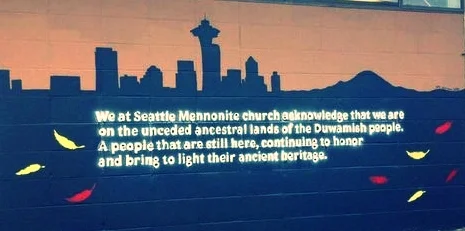How do we live in the light of our new awareness and not the darkness of violent, remorseless colonialism? Here's one idea.
/Monday was Indigenous Peoples Day, and it’s important that we make it more than an annual show of celebration and recognition. The potential power of a holiday like this is for it to be a yearly call to continued growth and lasting change.
One way to move in that direction now is to familiarize yourself with more Indigenous-led media, and with a few of the many brilliant Indigenous folks are out there right now boldly sharing their work, sharing their art, and sharing their experiences with the world. However you keep in touch with the world, use this week to be all the more intentional about it.
Another way to honor Indigenous Peoples Day as a time of reconciliation and growth is to come to a deeper understanding of and connection with the land you’re calling home. Whose loss made it possible for you to live where you live?
Native Land (nativeland.ca) makes it amazingly easy to uncover this information for yourself and your own specific situation. Using my address and an interactive map of the world, Native Land shows that I’m living on occupied Duwamish and Puget Sound Salish territory.
The site will also show you all the treaties signed concerning the land you live on, as well as the languages spoken. The 1855 Treaty of Point Elliott is evidently the most recent treaty regarding the land I call home in what today is called Seattle, and reading the treaty itself was powerful. It spells out in writing that the United States government forced the Indigenous people of this area to a small, confined area; that it offered pathetically small compensation for this eviction to a glorified concentration camp; and that it reserved the right to force them off even the reservation whenever the president should eventually see fit.
Awareness and acknowledgment are important first steps, but knowledge alone is not enough. We have to dig deeper. How do we integrate this new knowledge into our behavior and our daily lives? How do we use our awareness to live in a way that doesn’t perpetuate our violent past?
These are complicated questions, but we can’t let their complexity paralyze us into total inaction. One step in the right direction, I think, can be found here: Real Rent Duwamish (realrentduwamish.org).
Real Rent Duwamish allows you to set up a monthly “rent” payment to the Duwamish Tribe for the right to live on land in their unceded territory.
Why monthly?
“While one-time donations are essential to the upkeep of the Longhouse, paying monthly rent represents a continuing effort and desire to acknowledge the Duwamish while recognizing that we are visitors on their land who are profiting from being here. Monthly giving keeps the land's original inhabitants on the forefront of our thoughts. Through our monthly contribution and acknowledgement, we can be more deeply connected to this wonderful place.”
What’s the right rent for you?
“Just as everybody’s financial situation is unique, so is the amount of rent that will feel right for you. You may choose to give a percentage of your income or monthly rent or mortgage, or perhaps there is another number that holds symbolic significance for you. For example, paying $54 a month could serve as a powerful reminder of the 54,000 acres of homeland that the Duwamish Tribe signed over to settlers in 1855. In the end, any amount is the right rent as long as it’s meaningful to you! Or, click here to try out this donation calculator.”
This is made all the more important in the case of the Duwamish Tribe by the fact that the tribe is not officially recognized by the federal government. They would truly have been erased if not for the Duwamish people who continue today to fight to maintain their heritage and their identity. It feels like literally the least we can do to support that effort as we sit on their land, benefitting from its theft.
As of today, my family is paying $54 a month to the Duwamish Tribe for the foreseeable future. When we’re able to do more, we will.







